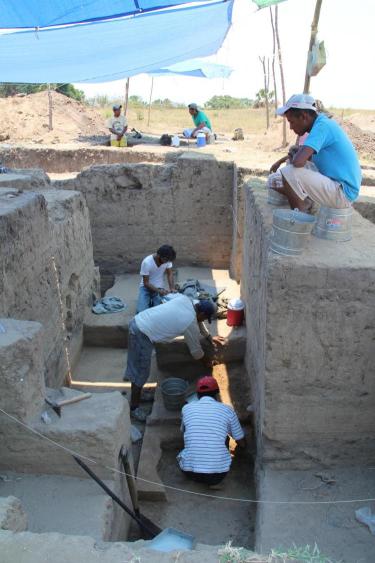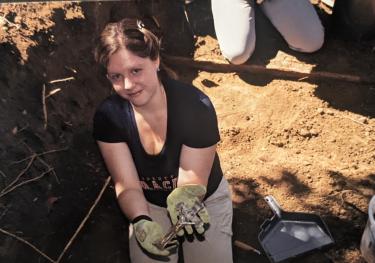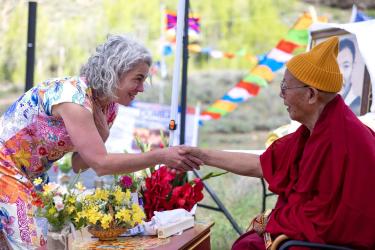Subdisciplines

The archaeology subdiscipline provides continuous geographic coverage of ancient societies from the Plains of North America through the Southwest and Mesoamerica to the Intermediate Area. The native societies we focus on range from egalitarian hunter-gatherers through middle range societies to the city-states and empires of Mesoamerica. The faculty’s theoretical and topical interests include human ecology, ethnoarchaeology, agency and social theory, lithic and ceramic analyses, remote sensing, disasters in ancient and modern times, and geophysical applications in archeology.
Archaeology links with biological anthropology in a number of ways. For instance, archaeologists encountering burials frequently turn to biological anthropologists for analyses of stature, health, and other topics. Many archaeologists and biological anthropologists share a deep interest in human ecology, i.e. the ways people have adapted to their environments and affected those environments. Archaeology also relates to cultural anthropology in significant ways, since much archaeological theory is derived from cultural theory. Given the vast diachronic interests of archaeology, significant archaeological theory is also derived independently from ethnography. Ethnoarchaeology spans the two subdisciplines, as archaeologists study the material culture of functioning contemporary societies to learn how better to make inferences about past behavior. Both archaeology and cultural anthropology study ethnic and political groups in contact with each other, including topics of migration, acculturation, trade and tribute, conquest, information sharing, elite emulation, and the rise of multiethnic powers.
Every summer, the CU Department of Anthropology conducts an archaeological field school for qualifying undergraduate and graduate students.
Archaeology Faculty
- Gerardo Gutiérrez – Mesoamerican Archaeology and Ethnohistory
- Sarah Jackson - Divisional Dean for Social Sciences - Mesoamerica, and particularly Classic Maya culture
- Eric Jones - Settlement ecology, landscapes and built environments, socioeconomic interactions, and demographic archaeology
- Arthur Joyce – Origins and development of complex societies of Mesoamerica
- Sarah Kurnick – Maya archaeology, community archaeology, social inequality, and political authority
- Scott Ortman – Historical Anthropology of the North American Southwest
- William Taylor - Human-environmental interactions, archaeozoology, and animal domestication

The biological anthropology faculty at CU have interests and research strengths that cross sub-disciplinary boundaries and foster collaboration with faculty and graduate students in other disciplines and sub-disciplines. We share an interest in human ecology, the broad integrative area of anthropology that focuses on the interactions of culture, biology and the environment. We also share an interest in the processes of globalization, which are rapidly changing many aspects of the modern world. As biological anthropologists, we are well positioned to analyze the impact of globalization on the interaction between biology and behavior, and to analyze human and primate adaptations to changing environments and declining biodiversity.
The department offers training in several different aspects of ecology: general ecology, early hominin paleoecology, nutritional, community, and evolutionary ecology. Our research foci also include anthropogenic and climatic effects on primate behavior and biology; conservation biology; primate evolution; feeding biology of humans and non-human primates; biogeochemical techniques for studying the diets and habitats of modern and fossil fauna; life history; endocrinology; growth and development; and maternal and infant health.
We carry out research and offer training and research opportunities at a wide range of international sites, including: Bezà Mahafaly, Madagascar; Lajuma Research Centre and the Mokopane Conservation Centre, South Africa; The Cradle of Humankind World Heritage Site, South Africa; museums in South Africa, Kenya, and Ethiopia; Kibale National Park, Uganda; Keneba, The Gambia; Cali, Colombia; Ta Kou Nature Reserve, Kien Luong Karst area, and Khau Ca Forest area, Vietnam. Our laboratories offer analytical capabilities and training in a broad range of methods, from measurement of human energy expenditure, to immunoassay and mid-infrared spectroscopy, to plant nutritional analysis. Our field sites offer training and research on primate health, community ecology, plant-animal interactions, forest ecology, nutritional ecology, conservation biology, dental ecology, and paleoecology.
Please note that we do not train students specifically in forensics.
More information on our graduate program
Biological Faculty
- Sharon DeWitte - Bioarchaeology, paleoepidemiology, and paleodemography
- Lauren Hosek - Skeletal plasticity and the life course, paleopathology, materiality, religion and the body, and mortuary archaeology
- Jonathan O'Brien - Feeding and sensory ecology of Southeast Asian colobines
- Michelle Sauther – Primate biology and ecology. Primate evolutionary biology, growth and development, life history, bio-behavioral responses to anthropogenic change
- Matt Sponheimer – Ecology of early human ancestors in Africa
- Fernando Villanea - Neanderthal and Denisovan ancestry in American populations
Among the topical interests of the cultural anthropology faculty are gender and sexuality, culture and power, modernity and consumption, kinship and relatedness, tourism and popular culture, medical anthropology, science and technology studies, human and political ecology, pastoralism, conservation and sustainability, museums, semiotics, concepts of “care,” nationalism and ethnic identity, racial constructs, post-colonialism, refugees and citizenship, and history and memory. Areas of regional expertise in the department include Latin America and the Caribbean, Native America, East Asia, South Asia, Southeast Asia, Tibet, East Africa, Scandinavia, Eastern Europe, and Papua New Guinea, as well as their respective diasporas around the world.

In addition, the cultural anthropology faculty share an interest in globalization, using ethnographic skills to understand the contemporaneous but countervailing forces that encourage both global homogenization and local fragmentation. Processes related to globalization studied by cultural anthropologists and graduate students include the increasingly planetary integration of the economy; the spread of human insecurity with the proliferation of ethnic and religious conflict, violence, crime, disease, and financial volatility; the global depletion and degradation of environmental resources; the impact of tourism and large-scale development projects; the internationalization of environmental, feminist, religious, and human rights movements; the response to democratic structures; the rise of “world cities;” the spread of new information and communication technologies; and the increasingly global flows of popular media, advertising and consumer goods. The cultural anthropology faculty’s interest in processes of globalization, human ecology, and applied anthropology also intersect with areas of specialization in archaeology and biological anthropology.
Cultural Faculty
- Gabrielle Cabrera - Temporality, affect, and gender, racialization, & ethnicity among undocumented migrants in the United States.
- Alison Cool– Medical anthropology and the anthropology of science and technology;
- Kathryn Goldfarb – Kinship and relatedness, mental health and neuroscience, child welfare, Japan;
- Donna M. Goldstein – Medical anthropology, political economy, anthropology of science, Latin America;
- Kira Hall – Linguistic Anthropology. Department of Linguistics;
- Christian Hammons – Ethnographic film, politics of indigenous religion, exchange, tourism, development, and globalization in Southeast Asia
- Jerry Jacka – Political ecology, resource development, Papua New Guinea
- Carla Jones – Globalization, subjectivity & governmentality, critical gender theory of Indonesia
- Carole McGranahan – Issues of power in local, global, historical contexts in Tibet and the Himalayas
- Jen Shannon – Curator of cultural anthropology within the University of Colorado Museum of Natural History

